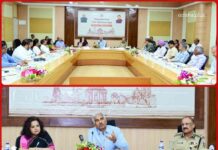Nilambar Rath
Goal 17 under UN Sustainable Development Goals talks on Strengthening Partnerships Across Sectors, Nations, and Stakeholders for a more Equitable, Sustainable, and Peaceful Future.

The United Nations has identified 17 Sustainable Development Goals (SDGs) to achieve a more equitable, sustainable, and peaceful world by 2030. Goal 17, in particular, is dedicated to strengthening partnerships for achieving all the SDGs.
The success of this goal is vital for the successful implementation of all other goals, and it recognizes the importance of collaboration and cooperation across sectors, nations, and stakeholders.
Partnership is key to success in achieving the SDGs because the goals are complex, multifaceted, and interconnected.
The issues we face today, such as poverty, hunger, inequality, climate change, and lack of access to education and healthcare, cannot be solved by any single entity or sector alone. They require a collaborative approach that involves governments, businesses, civil society, academia, media, and individuals, working together towards a common goal.
The role of media in achieving the SDGs is crucial, and it is particularly important for Goal 17. Media plays a significant role in shaping public opinion and influencing policy decisions. It is essential to create awareness about the SDGs and their importance in achieving a sustainable and equitable future.
The media can also facilitate partnerships between various stakeholders, create opportunities for dialogue and exchange of ideas, and hold governments and businesses accountable for their commitments towards the SDGs.
In India, achieving the SDGs is essential for building a more equitable and sustainable future. Despite making significant progress in the past few decades, India still faces challenges such as poverty, inequality, lack of access to education and healthcare, and environmental degradation. Thus, achieving the SDGs can help address these issues and create a better future for all Indians.

Here are some of the ways in which partnership plays a crucial role in achieving the SDGs:
- Mobilizing Resources: Achieving the SDGs requires a significant amount of resources, including financial, human, and technological. Partnerships between governments, businesses, and civil society can help mobilize these resources and ensure their efficient use.
- Sharing Knowledge and Expertise: Each stakeholder brings unique knowledge and expertise to the table. Collaboration and partnerships can help share this knowledge and expertise, leading to more effective and efficient solutions.
- Promoting Innovation: Partnership can also promote innovation, as stakeholders work together to find new and better ways of achieving the SDGs. By working together, we can find innovative solutions that are not possible when working alone.
- Advocating for Change: Partnership can also help create a collective voice for change. By working together, stakeholders can advocate for policies and initiatives that support the SDGs, leading to meaningful change.
- Holding Stakeholders Accountable: Partnership can also help hold stakeholders accountable for their commitments towards the SDGs. By working together, we can ensure that all stakeholders are fulfilling their responsibilities and making progress towards achieving the SDGs.
The success of Goal 17 is crucial for the successful implementation of all other SDGs. Because, by strengthening partnerships across sectors, nations, and stakeholders, we can achieve a more equitable, sustainable, and peaceful world.
Achieving the SDGs in India can help address the country’s socio-economic challenges and build a better future for all Indians. The media has an essential role to play in creating awareness about the SDGs, facilitating partnerships, and holding stakeholders accountable for their commitments.
By working together towards a common goal, we can create a better future for ourselves and our future generations.
(Author is a media veteran turned entrepreneur. Views are personal.)



















